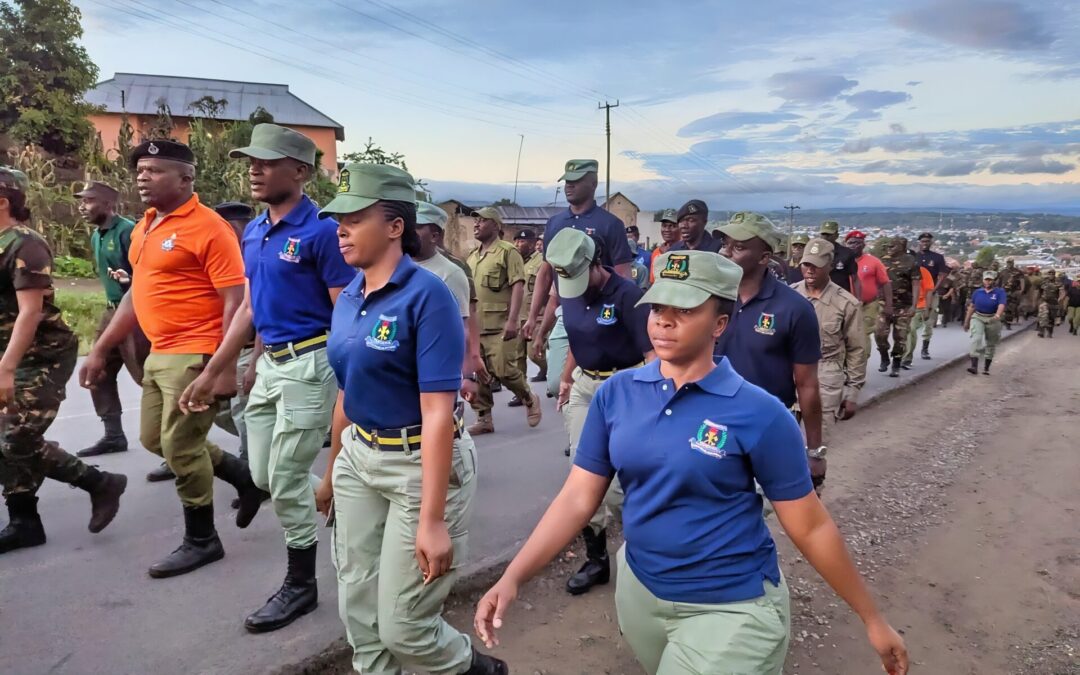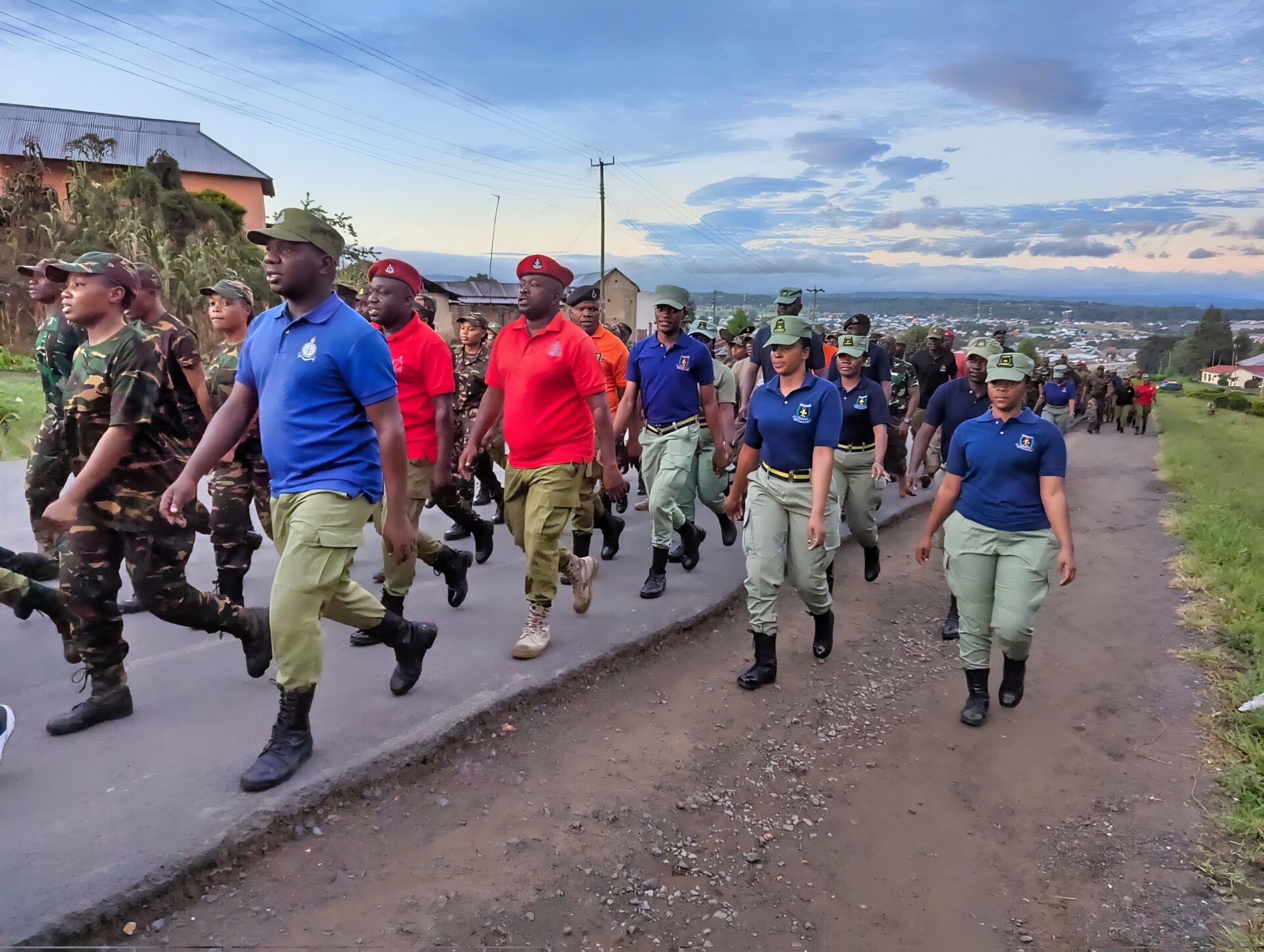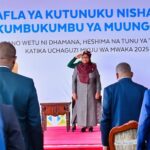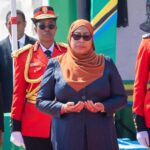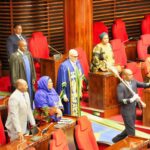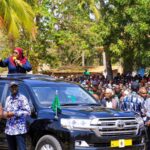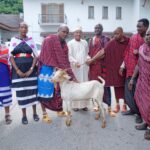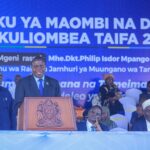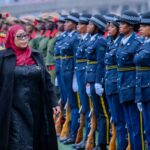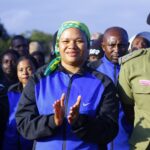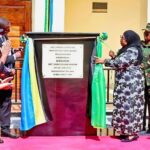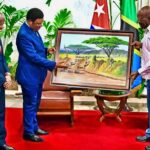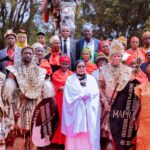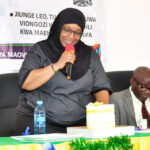Securing the Nation: Joint Exercises by TPDF, Police, and Immigration on Union Day
On April 26, 2025, Tanzanians across the nation came together to celebrate the 61st anniversary of the United Republic of Tanzania—a testament to unity, resilience, and shared vision. From the shores of Lake Victoria in Mwanza to the bustling streets of Tanga, citizens paused to honour the legacy of their founding leaders, Mwalimu Julius Kambarage Nyerere and Sheikh Abeid Amani Karume. Their visionary leadership forged an enduring union between Tanganyika and Zanzibar, creating a beacon of hope for Africa and beyond.
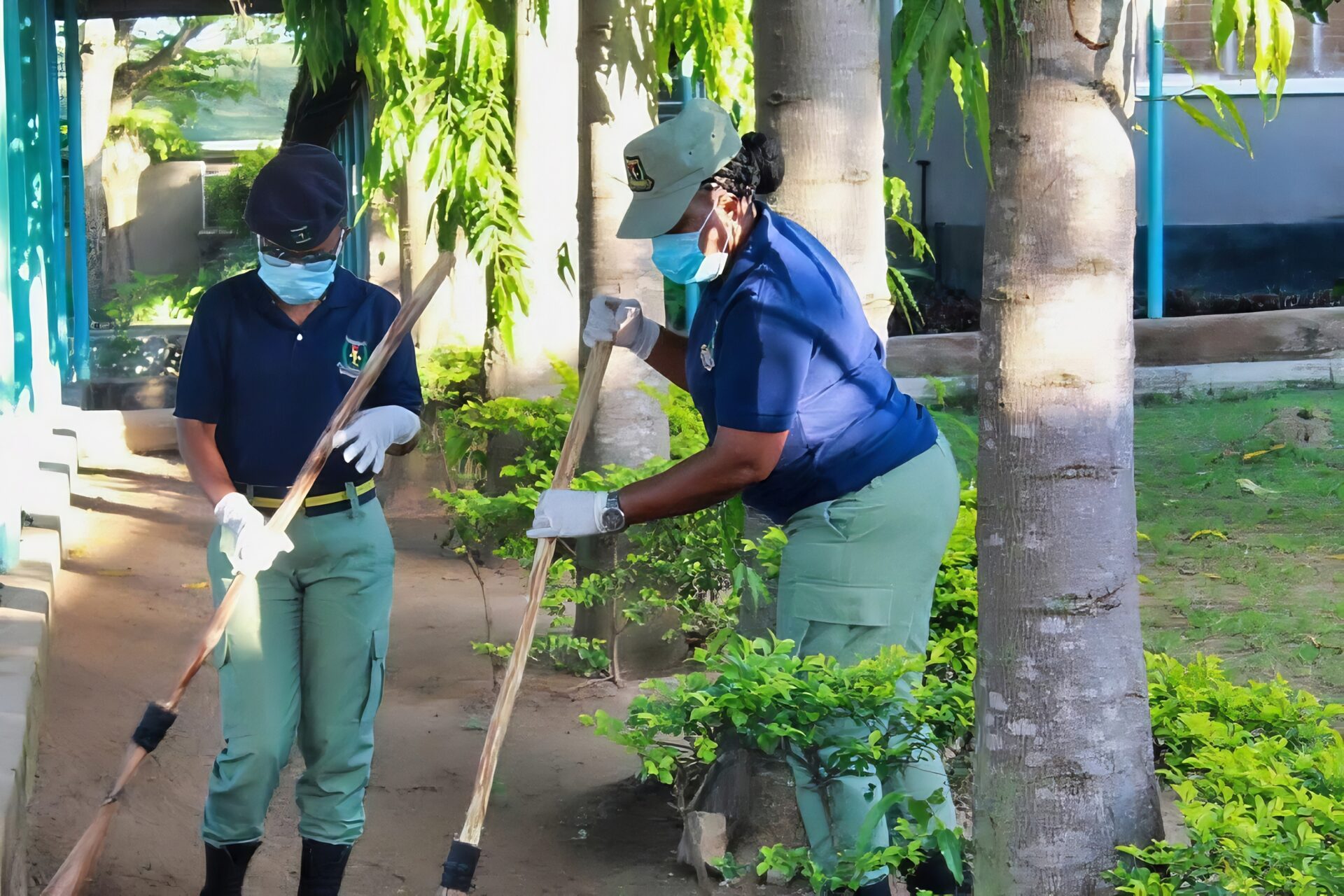
This year’s theme, “Our Union is a Guarantee, Honour, and National Pride,” resonates deeply as Tanzania prepares for its 2025 General Elections. It reminds us that unity is not merely symbolic, but a living commitment upheld through collective action. Whether it’s cleaning hospitals, participating in joint security exercises, or fostering neighbourly connections, Tanzanians are demonstrating that national pride begins at home.
But what does this milestone mean for Tanzania today? How can the spirit of Union Day inspire meaningful progress in governance, community engagement, and national security? Let’s explore seven key dimensions that highlight the significance of this celebration—and how they shape Tanzania’s future.
Honouring Founders’ Vision: A Legacy Worth Preserving
The foundation of the United Republic of Tanzania, established on April 26, 1964, was not merely a political merger between Tanganyika and Zanzibar, but a profound ideological union rooted in the principles of equality, self-reliance (ujamaa ), and mutual respect. This vision, championed by Mwalimu Julius Kambarage Nyerere and Sheikh Abeid Amani Karume, sought to create a nation where every citizen—regardless of ethnicity, religion, or region—could thrive together under a shared identity. Sixty-one years later, their ideals continue to resonate as guiding principles for national development and social cohesion.
A Vision Rooted in Ujamaa
At the heart of Mwalimu Nyerere’s philosophy was ujamaa , or African socialism—a call for collective responsibility, community empowerment, and equitable distribution of resources. He envisioned a society where wealth was not concentrated in the hands of a few but shared among all, fostering unity and reducing poverty. Similarly, Sheikh Karume emphasized inclusivity and collaboration, ensuring that Zanzibar’s unique cultural heritage remained an integral part of the union. Together, they laid the groundwork for a nation built on solidarity rather than division.

These principles were revolutionary at the time and remain relevant today. In a rapidly globalising world, Tanzania’s commitment to self-reliance stands out as a beacon of hope, encouraging citizens to take ownership of their destiny while prioritising local solutions over external dependencies. For instance, initiatives like “Buy Local” campaigns and investments in domestic industries reflect the enduring influence of ujamaa .
Challenges to Unity: Economic Disparities and Regional Tensions
Despite the noble aspirations of its founders, Tanzania faces significant challenges that test the strength of its union. Critics argue that economic disparities between urban and rural areas, as well as among regions, threaten the very fabric of national unity. Cities like Dar es Salaam and Arusha have experienced rapid growth, attracting investment and infrastructure development, while other regions lag behind. Such inequities can breed resentment and fuel regional tensions, undermining the sense of shared purpose envisioned by Nyerere and Karume.
Moreover, ethnic and cultural diversity—though a source of richness—can sometimes be exploited to sow discord. Political rhetoric that emphasises differences rather than commonalities risks eroding the unity painstakingly built over six decades. These concerns are valid and warrant urgent attention if Tanzania is to preserve the legacy of its founders.
Fostering Grassroots Solidarity: The Know Your Neighbour Campaign
In response to these challenges, initiatives like the Know Your Neighbour campaign play a vital role in fostering grassroots solidarity. Launched with the aim of promoting neighbourly connections, this campaign encourages Tanzanians to engage meaningfully with those around them, transcending barriers of ethnicity, religion, or socioeconomic status. By getting to know one another, citizens can dispel stereotypes, build trust, and reinforce their shared identity as Tanzanians.
For example, in rural villages across Dodoma, residents participating in the campaign have reported improved relationships with migrant workers who had previously been viewed with suspicion. Through dialogue and interaction, misconceptions were addressed, paving the way for greater harmony. Similarly, in urban centres like Mwanza, community leaders credit the campaign with reducing crime rates as neighbours became more vigilant and cooperative in safeguarding their areas.
Preserving the Legacy Through Action
To truly honour the vision of Mwalimu Nyerere and Sheikh Karume, Tanzania must address both systemic issues and individual responsibilities. On a macro level, policies aimed at narrowing economic disparities—such as targeted investments in underserved regions and inclusive education programmes—are essential. On a micro level, citizens must embrace the spirit of ujamaa by supporting one another and actively contributing to their communities.

Efforts such as hospital clean-ups led by immigration officers in Mwanza exemplify how small actions can embody larger ideals. When government institutions lead by example, they inspire ordinary citizens to follow suit, creating a ripple effect of positive change. Likewise, joint security exercises involving multiple agencies demonstrate the importance of collaboration in maintaining national stability—a cornerstone of the founders’ vision.
A Call to Uphold Unity
As Tanzania celebrates 61 years of unity, it is imperative to reflect on the values that brought the nation together and consider how best to preserve them for future generations. While challenges such as economic inequality and regional tensions persist, initiatives like the Know Your Neighbour campaign remind us that unity begins at the grassroots level. By fostering mutual respect, embracing diversity, and working collectively towards common goals, Tanzanians can ensure that the legacy of Mwalimu Nyerere and Sheikh Karume endures.
The Role of Community Service: Cleaning Hospitals and Beyond
On Union Day 2025, a remarkable scene unfolded in Mwanza, where officers from the Regional Immigration Department traded their uniforms for gloves and brooms to clean Sekou Toure Hospital. This act of service was not merely about tidying up a public space; it was a powerful symbol of unity, solidarity, and shared responsibility. In a nation that prides itself on the principles of ujamaa (African socialism) and collective effort, such gestures highlight the critical role public institutions play in addressing societal needs while fostering trust and collaboration with communities.
Community Service as a Catalyst for Change
Community service initiatives like the hospital clean-up in Mwanza are emblematic of the broader call to action that Union Day represents. At its core, Union Day is not just a celebration of political unity but also an opportunity to reaffirm the values of mutual support and civic duty. By rolling up their sleeves and participating in hands-on activities, government officials demonstrate that leadership is not confined to policymaking—it extends to tangible actions that improve the lives of ordinary citizens.
Sekou Toure Hospital, like many healthcare facilities across Tanzania, serves as a lifeline for thousands of patients and their families. However, underfunding, overcrowding, and limited resources often leave these institutions struggling to maintain cleanliness and hygiene. A clean hospital environment is not only essential for patient recovery, but also crucial for preventing the spread of infections. The efforts of the immigration officers in Mwanza addressed an immediate need while sending a clear message: public institutions must lead by example in serving the people they represent.
Building Trust Through Action
One of the most significant outcomes of community service initiatives is their ability to strengthen trust between citizens and authorities. Lately, there has been growing concern among Tanzanians about the disconnect between government agencies and the communities they serve. When public servants take the initiative to engage directly with citizens—whether through cleaning hospitals, planting trees, or repairing roads—they bridge this gap and foster a sense of accountability.
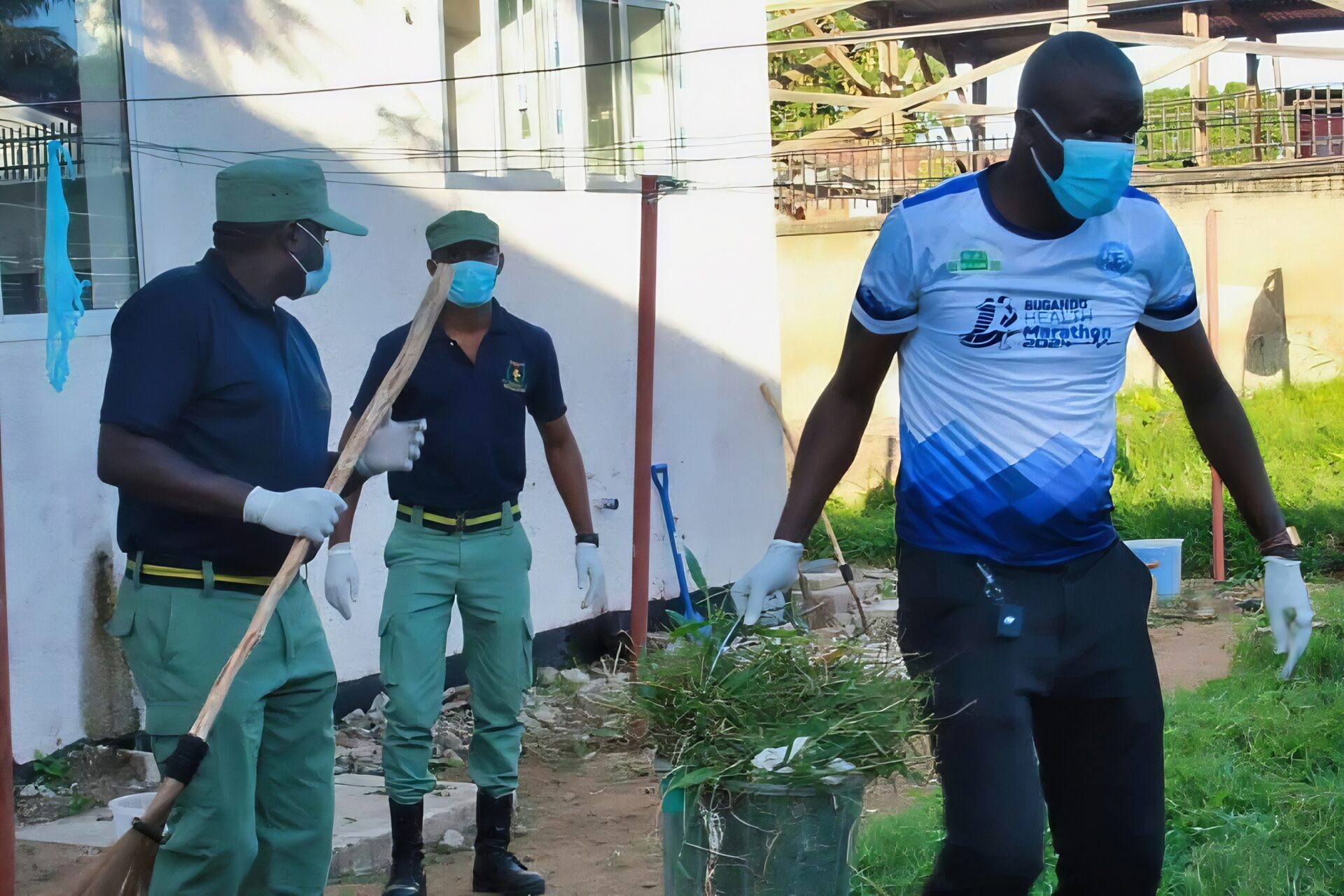
For instance, during the Mwanza clean-up, hospital staff expressed gratitude for the immigration department’s contribution, noting that such acts inspire others to take ownership of their surroundings. Patients and visitors who witnessed the event were equally moved, remarking that seeing officers work alongside them reinforced the idea that everyone has a role to play in building a better society. These interactions create positive memories and reshape perceptions of government institutions, transforming them from distant entities into partners in progress.
Small Acts, Big Impact
While cleaning a hospital may seem like a modest endeavour, its ripple effects can be profound. Small acts of service often spark larger movements, encouraging individuals and organisations to contribute in their own ways. For example, after the Mwanza initiative gained attention, local businesses donated cleaning supplies, schools organised environmental awareness campaigns, and youth groups volunteered to maintain public spaces in their neighbourhoods. Such cascading efforts demonstrate how one act of kindness can inspire a culture of care and responsibility.
This phenomenon aligns with the philosophy of ujamaa , which emphasises collective effort and shared ownership. When government agencies model this behaviour, they set a standard for others to emulate. Whether it’s a regional commissioner leading a tree-planting exercise or police officers organising road safety workshops, these actions remind citizens that leadership is about service—and that everyone benefits when we work together.
Beyond Hospitals: Expanding the Scope of Community Service
While the focus on hospitals is commendable, the spirit of community service should extend beyond healthcare facilities. Tanzania faces numerous challenges that require collaborative solutions, from improving access to clean water and sanitation to enhancing education infrastructure and combating climate change. Public institutions can play a pivotal role in addressing these issues by initiating projects that involve citizens and leverage local resources.
For example:
- Environmental Conservation: Joint efforts between forestry departments and local communities could help combat deforestation and promote sustainable agriculture.
- Youth Empowerment: Sports tournaments and mentorship programmes organised by security agencies could provide young people with constructive outlets and opportunities for growth.
- Disaster Preparedness: Fire and rescue services could partner with schools and villages to conduct emergency drills, ensuring that communities are equipped to handle crises.
By broadening the scope of community service, Tanzania can create a more resilient and inclusive society.
Addressing Counterarguments
Critics might argue that community service initiatives are superficial or merely performative, diverting attention from systemic issues such as inadequate funding for public services. While these concerns are valid, they overlook the transformative potential of grassroots action. Cleaning a hospital does not replace the need for increased investment in healthcare, but it complements it by raising awareness, mobilising resources, and fostering a sense of collective responsibility. Moreover, when public servants engage directly with citizens, they gain firsthand insights into the challenges faced by communities, enabling them to advocate for more effective policies.

Leading by Example
The hospital clean-up in Mwanza exemplifies how small acts of service can have far-reaching impacts. By working hand-in-hand with communities, public institutions address pressing needs and build trust, inspire action, and reinforce the values of unity and cooperation. As Tanzania celebrates 61 years of independence, let us remember that true progress begins at the grassroots level.
Strengthening Security Through Collaboration
In a world increasingly defined by complex and evolving security threats, Tanzania’s commitment to fostering unity extends beyond cultural or political harmony—it is deeply embedded in safeguarding the nation. Across regions such as Tanga, Mbeya, and Shinyanga, immigration departments have demonstrated this commitment by collaborating with defence and security agencies in joint exercises. These initiatives, ranging from cross-country runs to coordinated drills, underscore the critical importance of inter-agency collaboration in addressing modern security challenges. By working together, these agencies not only enhance their readiness but also build a foundation of trust and cooperation essential for national stability.
The Importance of Inter-Agency Collaboration
Security in the 21st century is no longer the sole responsibility of one agency or institution. Modern threats—such as terrorism, cybercrime, illegal immigration, and transnational organised crime—require a multi-faceted response that leverages the expertise and resources of various agencies. In Tanzania, the joint exercises conducted in preparation for Union Day exemplify this approach. For instance:
- In Tanga , officers from the Tanzania People’s Defence Force (TPDF), police force, prison service, fire and rescue teams, and immigration department participated in drills designed to simulate real-world emergencies.
- In Mbeya , personnel undertook an 8-kilometre cross-country run alongside members of the Nation Building Force (JKT) and the Prevention and Combating of Corruption Bureau (PCCB), emphasising physical fitness and operational synergy.
- In Shinyanga , regional commissioners led joint walks involving multiple agencies, reinforcing the idea that leadership must be actively involved in fostering unity and preparedness.
These exercises are not just about physical training; they are about creating a shared sense of purpose and understanding among different agencies. When officers from diverse backgrounds train together, they learn to appreciate each other’s roles, strengths, and limitations. This mutual understanding is invaluable during actual emergencies, where seamless coordination can mean the difference between success and failure.
Building Camaraderie and Trust
One of the most significant benefits of these monthly exercises is the camaraderie they foster among participants. Military and security personnel often operate in silos due to the specialised nature of their work. However, when brought together in joint activities, they break down barriers and build relationships that transcend institutional boundaries.
For example, during the exercise in Shinyanga, officers from the Tanzania People’s Defence Force (TPDF) and the immigration department shared meals and exchanged stories after completing their walk. Such informal interactions help dispel stereotypes and create a more cohesive working environment. As one participant noted, “When you know the person next to you, you’re more likely to trust them—and trust is everything in security operations.”
This camaraderie translates into tangible results during crises. Evidence from other countries indicates that consistent joint training improves response times, reduces miscommunication, and enhances overall effectiveness. For Tanzania, which faces challenges such as border insecurity and natural disasters, this level of preparedness is crucial.
Addressing Counterarguments: Are Monthly Exercises Worthwhile?
Despite the evident benefits, some critics question whether monthly exercises yield measurable outcomes. They argue that resources spent on these activities could be better allocated to equipping agencies with advanced technology or increasing manpower. While these concerns are valid, they overlook the long-term value of sustained collaboration.
Research and practical experience suggest that regular joint exercises play a vital role in maintaining operational readiness. For instance:
- Improved Coordination: Agencies that train together are better equipped to handle complex situations, such as responding to terrorist attacks or managing refugee influxes.
- Enhanced Morale: Participating in group activities boosts morale and fosters a sense of belonging among officers, which can reduce turnover rates and improve performance.
- Community Confidence: When citizens see security agencies working together, it reinforces their confidence in the government’s ability to protect them.
Moreover, these exercises provide an opportunity to identify and address gaps in communication or logistics before they become critical issues during real emergencies. The key lies in ensuring that these activities are well-planned, goal-oriented, and complemented by investments in infrastructure and technology.
Beyond Training: A Holistic Approach to Security
While joint exercises are a cornerstone of strengthening security, they must be part of a broader strategy that addresses systemic challenges. For example:
- Border Security: Collaborative efforts between immigration officers and the TPDF can help curb illegal immigration and smuggling, which pose significant risks to national security.
- Disaster Preparedness: Joint drills involving fire and rescue services, medical teams, and local governments can ensure swift responses to floods, droughts, or other natural disasters.
- Community Engagement: Security agencies should involve local communities in their initiatives, as residents often serve as the first line of defence against threats. Campaigns like #KnowYourNeighbor can complement official efforts by encouraging citizens to report suspicious activities.
By adopting a holistic approach, Tanzania can create a robust security framework that combines inter-agency collaboration with community involvement and technological innovation.
Unity in Action
The joint exercises conducted across Tanzania in celebration of Union Day are a testament to the power of collaboration in safeguarding the nation. They remind us that security is not the responsibility of a single entity but a collective effort that requires trust, coordination, and shared goals. While critics may question the immediate impact of these activities, the evidence suggests that consistent training fosters camaraderie and ensures smoother coordination during emergencies.
As Tanzania looks ahead to its 2025 General Elections and beyond, let us recognise that true unity is built on action—not rhetoric. By strengthening inter-agency collaboration, we protect our borders and communities and honour the vision of our founding leaders, who believed in the strength of unity.
Promoting Civic Responsibility: Reporting Illegal Immigrants
As Tanzania prepares for the 2025 General Elections, government officials have called upon citizens to play an active role in safeguarding national security by reporting illegal immigrants. This initiative is not merely about enforcing immigration laws but also about fostering a culture of civic responsibility, where every individual contributes to maintaining lawfulness and protecting the nation’s borders. While this request aligns with global practices of balancing openness with vigilance, it has sparked debate among Tanzanians. Some view it as a necessary measure to ensure security, while others fear it could be misused or lead to unintended consequences. Navigating these concerns requires transparency, clear communication, and a commitment to preserving social cohesion.
The Importance of Border Security
Tanzania’s geographic position in East Africa makes it both a transit hub and a destination for migrants from neighbouring countries. While migration can bring economic benefits, unregulated movement across borders poses significant challenges, including:
- Security Risks: Illegal immigration can facilitate human trafficking, smuggling, and even terrorism.
- Economic Strain: Undocumented migrants may place pressure on public services such as healthcare, education, and housing, particularly in urban centres like Dar es Salaam and Mwanza.
- Electoral Integrity: With elections approaching, there are legitimate concerns about non-citizens participating in voting processes, which could undermine the democratic process.
By encouraging citizens to report illegal immigrants, authorities aim to address these issues proactively. This approach empowers communities to take ownership of their security while ensuring that resources are directed toward those who are legally entitled to them.
Global Context: Balancing Openness and Vigilance
Tanzania is not alone in its efforts to manage migration and border security. Across the globe, nations grapple with similar challenges, striving to balance openness to refugees and migrants with the need to maintain law and order. For example:
- In the European Union, member states collaborate through agencies like Frontex to monitor borders and prevent irregular migration.
- In the United States, community-based initiatives encourage residents to report suspicious activities related to undocumented immigration.
These examples highlight that promoting civic responsibility in matters of national security is a common practice. However, they also demonstrate the importance of implementing such measures carefully to avoid alienating vulnerable populations or fostering divisions within society.
Addressing Concerns: Potential Misuse and Social Cohesion
While reporting illegal immigrants is intended to strengthen security, critics argue that it could be misused or exploited for political gain. There are fears that the initiative might:
- Target Vulnerable Groups: Refugees, asylum seekers, or marginalised communities could be unfairly targeted, leading to discrimination and mistrust.
- Undermine Social Cohesion: Encouraging citizens to report neighbours or acquaintances risks creating an atmosphere of suspicion and division, particularly in multicultural areas.
- Enable Political Manipulation: Opponents worry that the call to report illegal immigrants could be weaponised during election campaigns to incite fear or rally support along ethnic or regional lines.
To mitigate these risks, transparency, and accountability are essential. Authorities must clearly define what constitutes “illegal immigration” and provide guidelines on how reports should be handled. Additionally, robust mechanisms must be put in place to investigate claims fairly and protect individuals from harassment or false accusations.
Building Trust Through Clear Communication
For this initiative to succeed without undermining social cohesion, clear communication will be crucial. Citizens need reassurance that their actions will contribute positively to national security rather than sow discord. Key steps include:
- Public Awareness Campaigns: Launching educational programmes to explain the rationale behind the initiative and clarify misconceptions. For instance, distinguishing between undocumented migrants and refugees—who are protected under international law—can help prevent confusion.
- Community Engagement: Involving local leaders, civil society organisations, and faith-based groups in discussions about border security ensures that diverse perspectives are considered. These stakeholders can also act as mediators, helping to build trust between citizens and authorities.
- Protection Mechanisms: Establishing safeguards to protect whistleblowers and prevent retaliation against reported individuals ensures that the process remains fair and just.
Civic Responsibility Beyond Reporting
Reporting illegal immigrants is only one aspect of civic responsibility. True patriotism involves contributing to the broader well-being of society. Citizens can also:
- Support Legal Migrants: By welcoming documented migrants and helping them integrate into communities, Tanzanians can demonstrate hospitality while upholding the rule of law.
- Participate in Electoral Processes: Ensuring that elections are free, fair, and inclusive strengthens democracy and reinforces the values of unity and equality championed by Mwalimu Nyerere and Sheikh Karume.
- Engage in Community Development: Initiatives like the #KnowYourNeighbor campaign encourage citizens to build relationships based on trust and mutual respect, reducing the likelihood of misunderstandings or conflicts.
Counterarguments and Broader Implications
Critics rightly point out that addressing illegal immigration requires more than citizen vigilance; it demands systemic reforms. Strengthening border control infrastructure, improving documentation systems, and enhancing cooperation with neighbouring countries are equally important. Moreover, tackling the root causes of migration—such as poverty, conflict, and climate change—can reduce the number of people seeking refuge or better opportunities elsewhere.
However, dismissing the role of citizens entirely overlooks the power of grassroots action. When individuals act responsibly and report genuine threats, they contribute to a safer and more secure environment for everyone. The challenge lies in striking a balance between empowering citizens and avoiding policies that could harm innocent people or fracture societal bonds.
A Shared Responsibility
Promoting civic responsibility through initiatives like reporting illegal immigrants underscores the shared obligation of all Tanzanians to protect their nation. As the country approaches the 2025 elections, this call to action serves as a reminder that unity is built on collective effort and vigilance.
Bridging Divides Through Dialogue
In a world increasingly fractured by divisions—whether ethnic, cultural, or socioeconomic—the importance of fostering understanding within communities cannot be overstated. The #KnowYourNeighbor campaign, which gained momentum during Tanzania’s 61st Union Day celebrations, exemplifies how dialogue and interpersonal connections can bridge divides and strengthen the fabric of society. By encouraging Tanzanians to engage openly with those around them, this initiative promotes empathy, reduces suspicion, and builds bridges rather than walls. It is a timely reminder that unity begins at the grassroots level, where individuals interact daily and shape the tone of their communities.
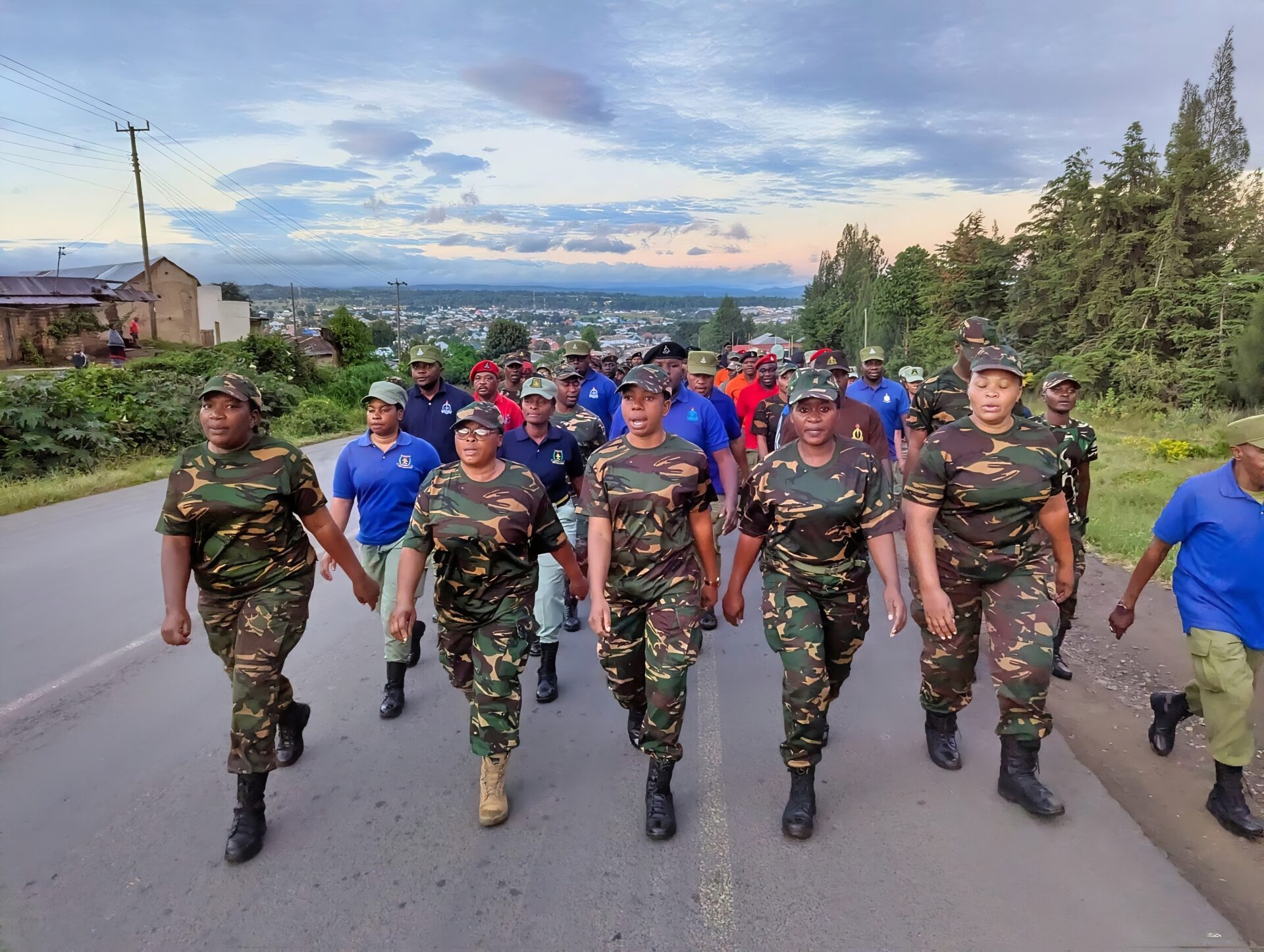
The Power of Knowing Your Neighbour
At its core, the #KnowYourNeighbor campaign is about breaking down barriers and fostering mutual respect. In a diverse nation like Tanzania, where over 120 ethnic groups coexist alongside migrants from neighbouring countries, misunderstandings, and stereotypes can easily arise. These misconceptions often stem from ignorance or fear of the unknown. By taking the time to know one’s neighbours—whether they are fellow citizens, migrant workers, or refugees—individuals can dispel myths, challenge prejudices, and build relationships based on trust and shared humanity.
Dialogue plays a central role in this process. When people talk to each other, they begin to see beyond superficial differences and recognise the common aspirations that unite them. For example, learning that a neighbour shares similar concerns about education, healthcare, or employment creates a sense of solidarity. This shared understanding lays the foundation for stronger, more cohesive communities.
Real-World Example: Mbeya’s Success Story
During the Union Day celebrations, residents in Mbeya shared inspiring stories of how the #KnowYourNeighbor campaign had transformed their neighbourhoods. One such story involved a group of local farmers who initially viewed migrant workers with suspicion, believing they were competing for jobs and resources. However, after participating in community dialogues organised as part of the campaign, these farmers began interacting with the migrants and discovered that many were fleeing hardships in their home countries and simply seeking better opportunities.
Through open conversations, the farmers learned that the migrants brought valuable skills and work ethic, which could complement their own efforts. Over time, collaborations emerged, with locals and migrants working side by side on agricultural projects. Misunderstandings dissipated, replaced by friendships and partnerships that benefited everyone involved. This real-world example demonstrates how dialogue can turn perceived threats into opportunities for growth and cooperation.
Addressing Polarisation Through Empathy
Polarisation is not unique to Tanzania; it is a global phenomenon exacerbated by social media, economic disparities, and political rhetoric. In Tanzania, regional and ethnic tensions occasionally surface, particularly during election periods, when divisive narratives may be used to mobilise support. The #KnowYourNeighbor campaign counters this trend by emphasising empathy and inclusivity.
For instance, in urban centres like Dar es Salaam, where rapid urbanisation has brought together people from different backgrounds, the campaign encourages residents to look beyond stereotypes and embrace diversity. A young professional in Kinondoni recounted how attending a community event introduced her to a retired teacher from Zanzibar, sparking a friendship that enriched both their lives. Such interactions remind us that our differences are sources of strength, not division.
Building Bridges Across Borders
While the campaign focuses primarily on fostering harmony within Tanzania, it also has implications for cross-border relations. As a hub for migration in East Africa, Tanzania hosts thousands of refugees and economic migrants from countries such as Burundi, the Democratic Republic of Congo (DRC), and Rwanda. Integrating these populations into local communities requires patience, understanding, and dialogue.
The #KnowYourNeighbor campaign offers a model for achieving this integration. By encouraging Tanzanians to view migrants not as outsiders but as potential contributors to their communities, the initiative helps reduce xenophobia and promote peaceful coexistence. For example, in Kigoma, where many Congolese refugees reside, local leaders have organised cultural exchange programmes that allow Tanzanians and refugees to share traditions, food, and stories. These exchanges humanise “the other,” fostering empathy and reducing tensions.
Challenges and Counterarguments
Critics might argue that initiatives like #KnowYourNeighbor are overly idealistic and fail to address deeper structural issues, such as inequality and systemic discrimination. While it is true that dialogue alone cannot solve all societal problems, dismissing its value overlooks the transformative power of personal connections. Small acts of kindness and understanding can create ripple effects, inspiring others to adopt similar attitudes and behaviours.
Moreover, the campaign does not operate in isolation. It complements broader government efforts to promote national unity, such as inter-agency collaboration and community service initiatives. Together, these measures create an ecosystem of trust and cooperation that strengthens Tanzania’s social fabric.
Unity Through Understanding
The #KnowYourNeighbor campaign embodies the spirit of Union Day by reminding Tanzanians that unity is not just a political concept—it is a lived experience rooted in everyday interactions. By engaging in dialogue and building relationships with those around them, citizens can overcome divisions and foster a culture of empathy and inclusivity.
As Tanzania prepares for the 2025 General Elections, let us remember that the strength of our union lies in our ability to connect across differences. Whether through sharing meals, exchanging stories, or collaborating on community projects, every interaction has the potential to build bridges and heal divides.
Preparing for Democratic Milestones: The 2025 Elections
As Tanzania approaches the 2025 General Elections, Union Day serves as a poignant reminder of the nation’s democratic journey and the importance of safeguarding its achievements. Over the past six decades, Tanzania has made significant strides in building a stable and unified state—a testament to the enduring vision of Mwalimu Julius Kambarage Nyerere and Sheikh Abeid Amani Karume. However, with every election comes an opportunity—and a challenge—to reaffirm the principles of peaceful transitions, inclusive governance, and democratic accountability. As citizens reflect on the progress made since the union’s formation, they must also consider how to uphold these values moving forward. Voter education, transparency, and fair representation will be pivotal in ensuring that the electoral process strengthens—not weakens—the union.
The Legacy of Peaceful Transitions
One of Tanzania’s proudest achievements has been its tradition of relatively peaceful elections. Unlike many countries in Africa, where electoral disputes have led to violence or instability, Tanzania has largely avoided such turmoil. This legacy is rooted in the nation’s commitment to unity and dialogue, principles that were championed by its founding leaders.
For example, during previous elections, political parties have engaged in robust campaigns while adhering to legal frameworks designed to ensure fairness. Despite occasional tensions, Tanzanians have demonstrated resilience and a willingness to resolve conflicts through institutional mechanisms rather than resorting to unrest. As the 2025 elections draw near, maintaining this tradition of peaceful transitions will require vigilance, cooperation, and a shared commitment to upholding democratic norms.
The Role of Voter Education
A cornerstone of any successful election is informed participation. Voter education plays a critical role in empowering citizens to make decisions that reflect their priorities and aspirations. In Tanzania, where literacy rates vary across regions, ensuring widespread access to accurate information about voting procedures, candidates, and policies is essential.
Efforts are already underway to prepare voters for the upcoming elections. For instance:
- Civic Workshops: Non-governmental organisations (NGOs) and civil society groups have organised workshops in rural areas like Dodoma and Iringa, teaching residents about the importance of their vote and how to identify credible sources of information.
- Media Campaigns: Radio programmes, television broadcasts, and social media initiatives are being used to reach younger audiences and first-time voters, particularly in urban centres like Dar es Salaam and Arusha.
- School Programmes: Educational institutions are incorporating lessons on democracy and civic responsibility into their curricula, ensuring that future generations understand the value of active citizenship.
By equipping citizens with knowledge, voter education initiatives enhance participation and reduce the risk of misinformation, which can undermine trust in the electoral process.
Transparency: A Pillar of Trust
Transparency is another critical factor in ensuring free and fair elections. When citizens perceive the electoral process as transparent, they are more likely to accept its outcomes—even if their preferred candidates do not win. Conversely, a lack of transparency can breed suspicion, erode confidence in institutions, and fuel post-election disputes.
To promote transparency in the 2025 elections, several measures could be implemented:
- Independent Oversight: Strengthening the role of independent electoral commissions, such as the National Electoral Commission (NEC), ensures impartial monitoring of polling stations and vote counting.
- Public Audits: Conducting pre- and post-election audits of voter rolls, ballot papers, and electronic systems reassures citizens that safeguards are in place to prevent fraud.
- Real-Time Updates: Utilising technology to provide real-time updates on voter turnout, results, and complaints allows stakeholders to track the process closely and address irregularities promptly.
In addition, fostering open communication between electoral authorities, political parties, and the public helps build consensus and minimises misunderstandings.
Fair Representation: Ensuring All Voices Are Heard
Democracy thrives when all segments of society feel represented and included. In Tanzania, achieving fair representation requires addressing disparities that may marginalise certain groups, such as women, youth, and ethnic minorities. For example:
- Gender Parity: While Tanzania has made progress in increasing female representation in parliament—thanks in part to reserved seats—it still lags behind some African nations in terms of gender equality in leadership roles. Encouraging more women to run for office and supporting their campaigns can help bridge this gap.
- Youth Engagement: With over 60% of Tanzania’s population under the age of 25, engaging young people in politics is crucial. Platforms like Youth Councils and digital forums can amplify their voices and encourage them to participate actively in shaping the nation’s future.
- Regional Balance: Ensuring equitable development across regions—from coastal Zanzibar to inland Singida—helps address grievances and fosters a sense of belonging among citizens who might otherwise feel neglected.
Challenges Ahead: Addressing Potential Risks
Despite Tanzania’s strong foundation, the 2025 elections are not without risks. Some challenges include:
- Misinformation: The rise of social media has made it easier for false narratives to spread, potentially influencing voter perceptions and behaviour.
- Ethnic Politics: Although Tanzania has largely avoided ethnic-based divisions, there is always a risk that politicians may exploit regional loyalties for personal gain.
- Resource Constraints: Limited funding for electoral bodies and logistical challenges in remote areas could hinder the smooth conduct of elections.
Addressing these risks requires proactive measures, including stricter regulations on hate speech, increased investment in electoral infrastructure, and collaboration with international partners to share best practices.
Strengthening the Union Through Democracy
The 2025 General Elections represent both a milestone and a test for Tanzania. They offer an opportunity to celebrate the nation’s democratic achievements while reinforcing the values that have kept it united for over six decades. By prioritising voter education, transparency, and fair representation, Tanzanians can ensure that the electoral process reflects their collective will and strengthens the union.
Looking Ahead: Building a Prosperous Future
Union Day is not only a celebration of Tanzania’s past achievements but also an invitation to envision the future. As the nation reflects on 61 years of unity, peace, and progress, it is imperative to ask: What kind of country do Tanzanians want to build for future generations? The answer lies in embracing economic diversification, sustainable development, and technological innovation as pathways to prosperity. However, achieving these ambitious goals requires sustained effort, creativity, and collaboration across all sectors—from government and private industry to civil society and individual citizens.
Economic Diversification: Reducing Dependence on Traditional Sectors
For decades, Tanzania’s economy has relied heavily on agriculture, mining, and tourism. While these sectors remain vital, over-reliance on them leaves the nation vulnerable to external shocks, such as fluctuating global commodity prices or natural disasters. Economic diversification offers a solution by expanding into new industries that can drive growth and create jobs.
Examples of promising sectors include:
- Manufacturing: Developing local manufacturing capabilities—particularly in textiles, agro-processing, and construction materials—can reduce imports, boost exports, and generate employment opportunities.
- Technology and Innovation: Investing in tech startups and digital infrastructure positions Tanzania as a regional hub for innovation. Cities like Dar es Salaam are already home to budding entrepreneurs leveraging mobile technology to solve everyday problems.
- Renewable Energy: With abundant solar, wind, and hydroelectric resources, Tanzania has immense potential to become a leader in clean energy production, reducing reliance on fossil fuels and enhancing energy security.
To support these efforts, government policies must prioritise investment in education, skills training, and infrastructure. For instance, initiatives like the Strategic Cities Project, which aims to transform secondary cities into economic powerhouses, demonstrate how targeted investments can spur growth outside traditional urban centres.
Sustainable Development: Balancing Growth with Environmental Stewardship
As Tanzania strives for economic progress, it must also ensure that development is sustainable and environmentally responsible. Climate change poses significant risks to the nation, from rising sea levels threatening coastal communities to prolonged droughts affecting agricultural productivity. Addressing these challenges requires a commitment to conservation and green practices.
Key areas for action include:
- Afforestation and Reforestation: Programs like the Green Belt Initiative, which encourages tree planting, help combat deforestation while creating income-generating opportunities for rural populations.
- Water Management: Improving access to clean water and implementing efficient irrigation systems can mitigate the impacts of drought and support agricultural resilience.
- Wildlife Conservation: Protecting Tanzania’s rich biodiversity—not only for ecological reasons but also for its role in sustaining tourism—is crucial. Community-based conservation models, where local residents benefit financially from wildlife preservation, have proven effective in areas like the Serengeti and Selous Game Reserve.
Individuals too can play a part by adopting eco-friendly habits, such as reducing plastic use, supporting sustainable brands, and participating in environmental clean-up campaigns. Every small action contributes to a larger culture of environmental stewardship.
Technological Innovation: Harnessing the Power of Digital Transformation
In today’s interconnected world, technological innovation is a key driver of economic and social transformation. Tanzania has already made strides in this area, particularly through mobile money platforms like M-Pesa, which have revolutionised financial inclusion. However, there is still untapped potential to leverage technology for broader societal benefits.
Opportunities for advancement include:
- E-Government Services: Expanding access to online services—such as tax filing, business registration, and healthcare appointments—can streamline bureaucracy and improve efficiency.
- Education Technology (EdTech): Integrating digital tools into classrooms enhances learning outcomes, especially in underserved areas where qualified teachers may be scarce.
- Smart Agriculture: Technologies such as drones, satellite imaging, and soil sensors enable farmers to optimise crop yields, conserve resources, and adapt to changing weather patterns.
To fully harness these opportunities, Tanzania must address barriers such as limited internet connectivity, high data costs, and digital literacy gaps. Public-private partnerships can play a pivotal role in overcoming these challenges and ensuring equitable access to technology.
The Role of Individuals: Small Actions, Big Impact
While systemic changes are essential, individuals also have a critical role to play in shaping Tanzania’s future. Everyday actions can collectively drive meaningful progress. Some actionable insights include:
- Supporting Local Businesses: By purchasing goods and services from local entrepreneurs, citizens contribute to job creation and economic empowerment. Farmers’ markets, artisanal crafts, and small-scale manufacturers all benefit from community support.
- Advocating for Environmental Conservation: Joining or volunteering with organisations focused on sustainability amplifies individual impact. Whether it’s planting trees, cleaning beaches, or raising awareness about climate change, every effort counts.
- Participating Actively in Civic Life: Engaging in governance—whether through voting, attending town hall meetings, or joining advocacy groups—ensures that citizens’ voices are heard and their needs addressed.
These contributions may seem modest, but when multiplied across millions of Tanzanians, they can spark transformative change.
Challenges to Overcome: A Call for Collaboration
Building a prosperous future will not be without obstacles. Key challenges include:
- Infrastructure Gaps: Inadequate roads, electricity, and internet connectivity hinder economic growth and limit access to opportunities.
- Youth Unemployment: With a rapidly growing population, creating enough jobs for young people remains a pressing concern.
- Corruption and Governance
Addressing these challenges requires collaboration between government, businesses, and citizens. For example, public-private partnerships can fund infrastructure projects, while vocational training programs can equip youth with marketable skills. Similarly, grassroots movements advocating for good governance can hold leaders accountable and foster trust in public institutions.
A Shared Vision for Tomorrow
Union Day serves as a reminder that Tanzania’s strength lies in its unity—and that this unity must extend to building a brighter future. By pursuing economic diversification, sustainable development, and technological innovation, the nation can unlock its full potential and secure lasting prosperity for generations to come.
Conclusion: Strengthening the Bonds That Unite Us
Tanzania’s 61st Union Day is far more than a commemoration of a historical milestone—it is a clarion call to action. It challenges every citizen, leader, and institution to reflect on their role in nurturing unity, peace, and progress. From the hospital clean-ups led by immigration officers in Mwanza to the joint security exercises in Tanga, Mbeya, and Shinyanga, the diverse activities carried out this year underscore a profound truth: true unity is not achieved through grand gestures but through everyday actions that affirm our shared humanity and collective responsibility.
The Power of Collective Effort
At its heart, Union Day celebrates the extraordinary power of collective effort. When individuals and institutions come together—whether to clean a hospital, participate in a cross-country run, or engage in dialogue with neighbours—they demonstrate that unity is a living, breathing force. These seemingly small acts ripple outward, creating a culture of care, accountability, and collaboration. For example:
- In Mwanza, the act of cleaning Sekou Toure Hospital was not just about improving a public facility; it was a tangible expression of solidarity between government agencies and the community.
- In Shinyanga, the joint walk led by regional commissioners and defence agencies highlighted the importance of inter-agency cooperation in safeguarding national security.
- Across Tanzania, the #KnowYourNeighbor campaign reminded citizens that understanding and empathy are the cornerstones of a cohesive society.
These efforts remind us that unity is not an abstract concept—it is built through consistent, intentional actions that prioritise the common good over individual interests.
Honouring the Legacy of Our Founders
As we celebrate Union Day, we are also called upon to honour the sacrifices and vision of our founding leaders, Mwalimu Julius Kambarage Nyerere and Sheikh Abeid Amani Karume. Their commitment to equality, self-reliance (ujamaa ), and mutual respect laid the foundation for a united Tanzania. Yet, as we look ahead to 2025 and beyond, it is clear that preserving this legacy requires vigilance and dedication.

Protecting the bonds that unite us means addressing the challenges that threaten our cohesion—whether they stem from economic disparities, regional tensions, or social divisions. It means fostering inclusivity, ensuring fair representation, and promoting transparency in governance. Most importantly, it means embracing the spirit of ujamaa by working together to build a nation where everyone has the opportunity to thrive.
Looking Ahead: A Vision for 2025 and Beyond
The upcoming 2025 General Elections present both an opportunity and a challenge. They offer a chance to reaffirm Tanzania’s democratic values and strengthen its institutions. However, they also require us to remain vigilant against forces that could undermine unity, such as misinformation, polarisation, or attempts to exploit ethnic or regional differences. By prioritising voter education, transparency, and civic engagement, Tanzanians can ensure that the electoral process reflects the will of the people and reinforces the union.
Beyond elections, Tanzania must continue striving for sustainable development, economic diversification, and technological innovation. Achieving these goals will require collaboration across all sectors—from government and businesses to civil society and individual citizens. Whether it’s supporting local enterprises, advocating for environmental conservation, or participating actively in civic life, every contribution matters.
A Nation’s Strength Lies in Its People
Ultimately, Tanzania’s strength is not measured by its wealth, power, or global standing—it is measured by the resilience of its people and the depth of their commitment to one another. The nation’s ability to overcome challenges and seize opportunities depends on the strength of the bonds that unite its citizens. These bonds are forged through shared experiences, mutual respect, and a collective determination to build a better future.
As we celebrate Union Day, let us carry forward its spirit by protecting and strengthening the ties that bind us. Let us remember that unity is not a destination but a journey—one that requires constant nurturing and unwavering dedication. By doing so, we ensure that Tanzania remains a shining example of what unity can achieve—a beacon of hope and inspiration for Africa and the world.
Final Thought
“A nation’s strength is measured not by its wealth or power, but by the resilience of its people and the depth of their commitment to each other.”
Happy Union Day, Tanzania! Here’s to 61 years of unity—and to many more chapters of progress, prosperity, and shared purpose. Together, we can build a future that honours the sacrifices of our founders and fulfils the aspirations of our children.
Tanzania Media

